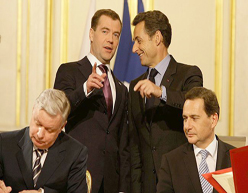Paris and Moscow boost intergovernmental cooperation across all spheres of bilateral diplomacy

PARIS, France - During his recent state visit to France, Russian President Dmitry Medvedev and his French counterpart, Nicolas Sarkozy, demonstrated in every possible way their readiness to expand the existing spectrum of cooperation between the Kremlin and Elyse Palace — both within the frameworks of bilateral actions between Moscow and Paris and also within the frameworks of multilateral cooperation formats in various international organizations such as the G8 and G20 clubs — as they seek solutions to new global challenges on the geopolitical arena.
This March visit to France was the third for the current Kremlin landlord since he became the Russian president in May 2008. The two previous visits, which in the official diplomatic legal lexicon were termed ‘official working trips’, took place at the end of 2008. The first was in October, when Medvedev participated in the International Conference dedicated to Global Politics, and the second took place in November, when he went to Nice to attend the EU-Russia Summit.
But the March trip was named a ‘State Visit’ in the official diplomatic legal lexicon, thus underscoring its special diplomatic status, and consequently, the reception was held at the highest protocol level for a visiting foreign dignitary. This time the heads of state focused their discussions on the amplification of cooperation in foreign policy interactions between Russia and France, their roles and efforts in finding lasting solutions to acute geopolitic problems on the international agenda.
Specifically, the presidents discussed such issues as the improvement of European security, including the initiative recently put forward by Medvedev on signing a the new universal agreement for collective safety on the continent, the deteriorating situation around the Iranian nuclear program, the situation in Afghanistan, the status of the Middle East Peace Process, the results of the Copenhagen Conference on Climate Changes and several others.
Summarizing the results of their negotiations, Sarkozy, who had frequently called his Moscow guest a ‘personal friend’ and referred to Russia as a ‘strategic partner of France several times during the talks, highly praised the outcomes of their negotiations. “It seems to me that both of us have very close points of view on all the basic issues that that we discussed during our meetings,” he added.
From his part, the Russian leader also used only superlative degrees of adjectives to describe the current state of the bilateral relationships between Russia and France. “We are really strategic partners and friends. This is so not because of our personal desire, but because this reflects our common European visions and aspirations as well as our vision for our mutual bilateral interests.”
By Josephine Saint-Laurent (from Paris)












 Web design,
Web design,